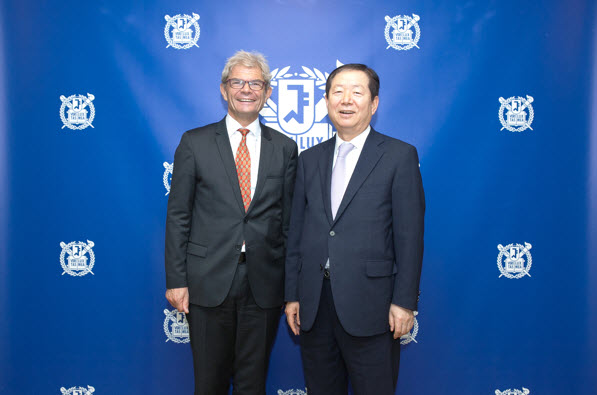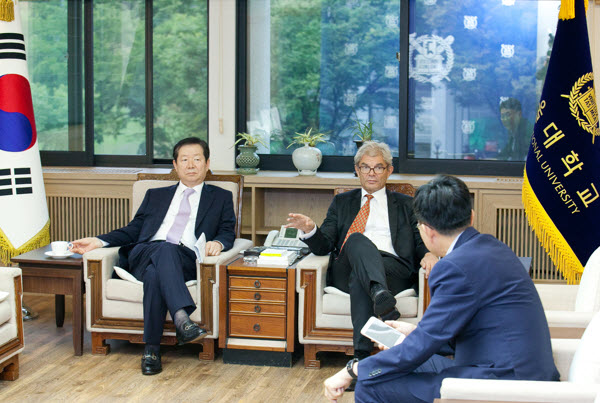
German Ambassador to Korea Rolf Mafael (left) and President SUNG Nak-in
On October 1, German ambassador Rolf Mafael gave a lecture at the Graduate School of International Affairs at Seoul National University (SNU) called ’25 Years of German Unification: A Success Story’ aimed at discussing what North and South Korea can learn from the reunification of Germany.
Mafael stressed that “continuous exchange between North and South Korea was the way to reunification” and that “in order to do this, South Korea must play an active role.”
He recounted German history and pointed out parts that Korea could refer to. West and East Germany were separated for almost 50 years, and they were reunited in 1989 with the fall of the Berlin wall, and overtime, with much initiation from West Germany, it has been a success. Germans also had a clear sense that they were citizens of one Germany before the war.
He firmly believed that South Korea would have to be the one to initiate the reunification. “Germany spent forty years preparing for reunification, and it was West Germany that initiated the process. South Korea will also have to pave the path.”

Ambassador Mafael at SNU
In order for President Park Geun-Hye’s policy “Reunification is Success” to be an actual success, Mafael explained that Korea needs to refer to Germany’s example. He mentioned specifics such as recognizing Korea’s inconsistencies in the approach to the issue of reunification. He noticed that despite Germany’s change of government, reunification was always a priority, whereas policies that were implemented during President Kim Dae-joong and Roh-muhyun’s administration did not get passed down, resulting in inconsistency in reunification efforts.
At the end of the lecture, a student brought up that the situation of 1990 Germany is significantly different from Korea, and that Korea is facing problems such as the fact that people have a conservative attitude toward reunification, North Korea is under a dictatorship, and that Korea does not rely on America or China to help.
Mafael conceded, “North Korea’s unique disposition, as a country under dictatorship, was indeed very different from Germany’s situation; therefore, at a political stance, South Korea is the one that needs to take a more active initiative toward reunification.”
Written by Ho Jung Annie Hwang, SNU English Editor, annieohan@snu.ac.kr
Reviewed by Eli Park Sorensen, SNU Professor of Liberal Studies, eps7257@snu.ac.kr

